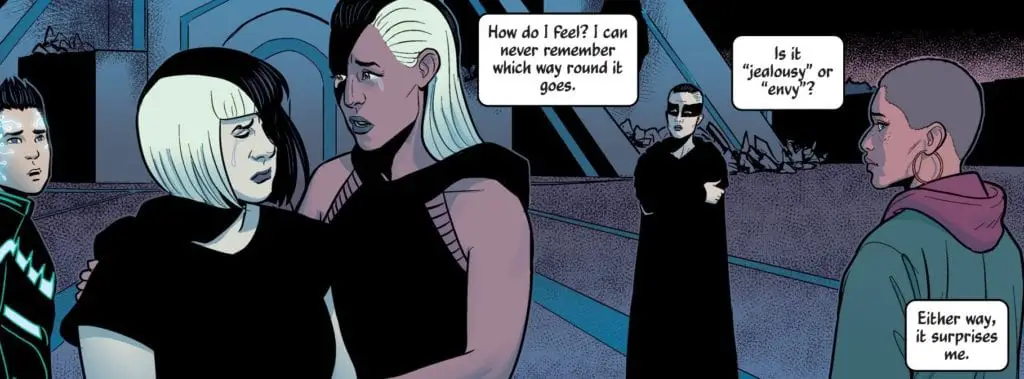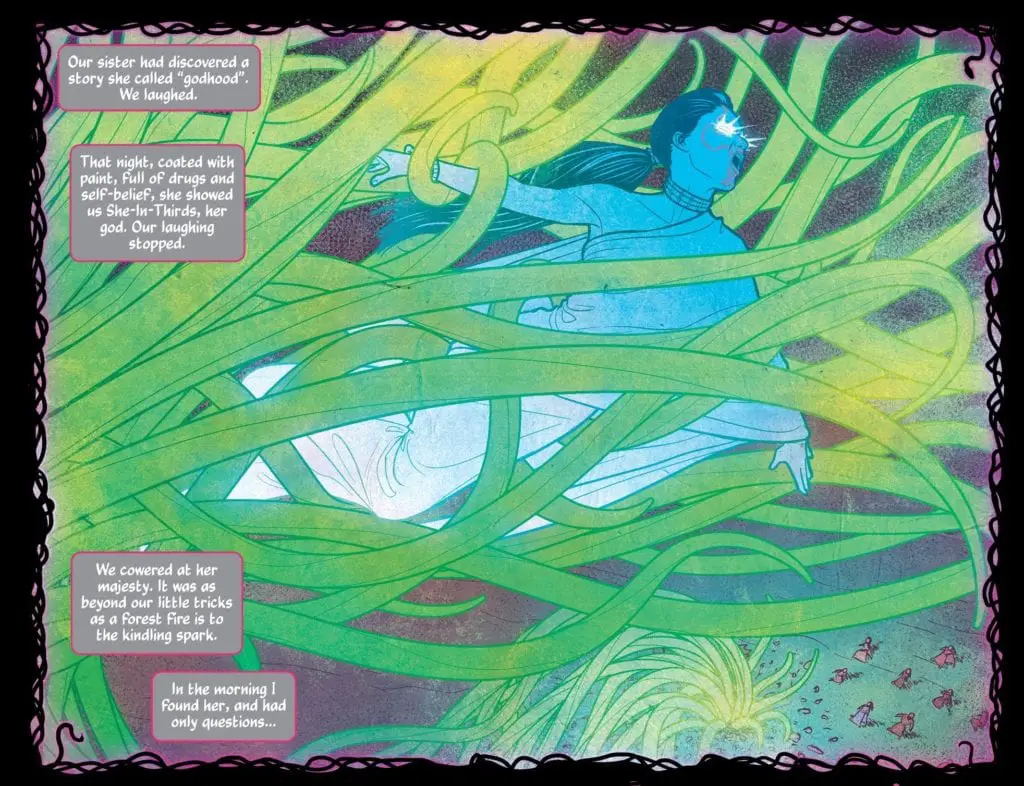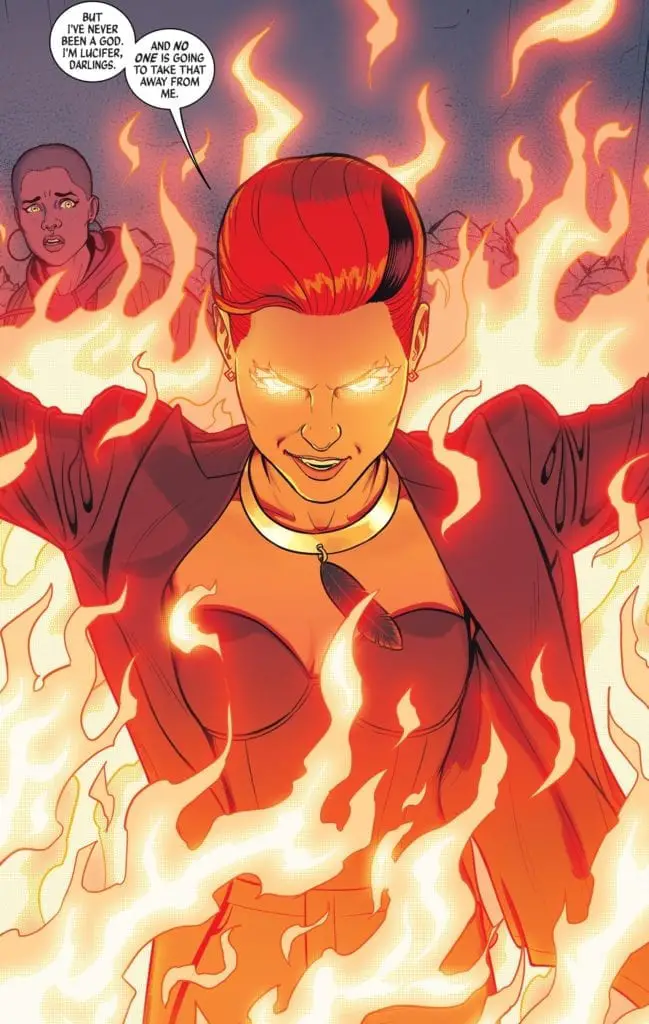Urdr featured in the cover? Not the first time, but I do love me some Cass. Great start for a great issue.
By way of a prologue, let me just acknowledge a moment of realization sparking far too late. The endgame arc’s title Mothering Invention is a play on the adage of, “Necessity, mother of invention,” which of course, points us in the direction of everyone’s favorite intergenerational villainous duo of Ananke and Minerva. This is really fitting considering we’ve been exploring this duo’s intentions and means in the past few issues. It’s one of two ways to pose an effective antagonist: either deeply exploring their motivations or leaving them playfully scattered in the dark ala Richard III and Kurtz.
However, no matter how much progress we make understanding the Crone and the Maiden, we’re always one step behind the full picture. It’s too conventional to weave an overarching view on the whole with just the majority of the pieces in place. And one of the things The Wicked + The Divine does most beautifully is subverting some of those conventions while brutally hammering others tight. Without further ado, let’s dive into this issue, and get a look at some actual effective subversion. #SubvertingExpectations2019
This is also an actual crowd pleaser to boot.
Issue 43
“And whatever happens, you’ll get to live.”
We open up with Cass’ old filming crew, Beth and her lackeys, in the ruins of Valhalla awaiting Minerva’s arrival. Ever since their conversion into Valkyries, Beth has been even more insufferable than before. Her unwarranted self-importance, her zeal for the job, and the bloody job itself start rubbing Toni and Robin the wrong way. But Beth’s rebranding of the trio as Nike, Eros, and Phobos won’t get much of a start, as Minerva turns them into mindless puppets upon entering. During desperate times, she will need all the manpower available. With Woden (deservedly) dead, Minerva’s original plan for a zombie plague is a no go.
Instead, she’ll have the Gods lay waste on all civilization themselves by turning them into puppets, as you do.
Now we shift to the good guys’ side as they walk towards the gates of Valhalla to face Minerva. But things aren’t that simple at present. Recently revived Dionysus is pretty affected by Nergal’s sacrifice to bring him back. And being the swell guy he is, he asks his fellow Underworld Gods to try and revive Cameron. Close, but no cigar—Lucifer won’t, Laura can’t. Further discussion is cut short by the vanguard of Minerva’s puppets at the entrance, which of course, means battle. Through Laura’s inner monologue, we learn that the Valkyries are more than a match for the Gods, but Tara saves the day by using her powers to go giant.
I vaguely suspect that the composition of the battle is a homage to Marvel or DC (Possibly Avengers, though), as it is the most superhero-like panel we’ve gotten in WicDiv. And it looks phenomenal. Our guys’ momentum falls flat with an eerie Woden-ish palette that turns the scenery lime green. This is Minerva snatching the upper hand by using Woden’s hivemind broadcast, sapping our heroes of their might. Keep in mind, this is a dire turn in itself. But it becomes even worse when you consider this is what befell Dio back in Issue 32.
Alas, we don’t get a grim reprise. No one steals Dio’s show twice! Our beautiful boy uses his powers to nullify the hivemind broadcast and shatter Minerva’s control of all puppets. It’s a refreshing shift of the tide. And it’s made even better by Robin punching the lights out of Beth and quitting on the spot. The rest of the Valkyries split up also, which significantly thins out Minerva’s means. Yet the little girl is still unpredictable. At the finale’s threshold, this may well be the last time they set foot outside of Valhalla. Urdr knows this, so she lets her fellow Norns Verdandi and Skuld go. There’s resistance aplenty on their behalf, but they ultimately take their leave in a moment both sweet and sad.
There goes the finest filming crew Cass ever had. Aside from Laura, these two have been great forces in Cass’ character development. And they have also played their part as heroes themselves, nameless as they were.

Finally, our guys corner Minerva inside of the ruins of Valhalla. Though she still retains some snark, she’s really quite powerless now. The one power she still has is to tell the original story: the birth of godhood. And even that she cannot do by herself, so Laura uses what remains of her powers to channel that narrative for all to see. That’s right, the final piece is here.
No, it’s not anticlimactic at all, if that’s what you dread from this being built up so long. Okay, here goes.
It all started when Ananke was fourteen, back in that irretrievably ancient past. She and her sister Persephone were alone on a cold night. To keep them from catching their death, Persephone reveals a secret she has kept out of fear of being deemed a monster. She can spark fire out of thin air by snapping her fingers. Ananke then reveals to her sister she can do the same. Warm, and joyful, they decide that night to search for others like them, and learn about this gift. Fourteen years later, the sisters have formed a circle of individuals with the same abilities and mission. They gather around the fire and speak of what they’ve learned.
On this second night, they share their findings. The first is that after their death, another set of twelve will be born with uncanny abilities. The second, though, is a show stopper. Persephone tells the others about her greatest finding. High as hell and inspired, Persephone tells them the story of godhood itself, and of her God, She-in-Thirds. The woman incarnates this divine presence in a performance that turns their peers into believers. Godhood is a tale that you sing, and as long as you believe it, you will attain great power. But the reaches of such power were yet unknown to them. Thus, the circle set out to explore the song and try to attain power through it.
Through the death of one of their friends, the sisters learned the core nuances to this song called divinity. The song reduces the individual to a cluster of concepts, stripping away the countless nuances of being human, turning them into Gods and nothing else. And one can sing the song for only two years before it consumes them. Ananke then realized the song was one they already believed about themselves, prior to godhood.
With the passing of time, Ananke refines her theory. She builds upon her sister’s She-in-thirds. And she shares it with Persephone when the tale is fully crafted. Along with the twelve divine ones, a thirteenth one will join them to pass the song along. A symbolic number of sacrifices will be necessary to feed She-in-Thirds and allow the storyteller to cross into the next generation. However, Persephone is not keen on the idea. She sees the song of divinity as a death trap for all who sing and believe it. Furthermore, she realizes they would need to sacrifice some of their friends for Ananke’s tale to come true.

Ananke told this to Persephone as a musing only. A theoretical way to transcend death and live across the generations. But we know better. Fast forward a few years more, and kinslayer Ananke meets the first Minerva. Together they set out to execute a scheme that would last years, and years, and years…
It’s back to the present day now.
The retelling of the first story drove Minerva and Laura to tears. For the latter, this is a confirmation of something she had suspected already. Ascension was only a shortcut. The gift was already theirs. Becoming a god was a lie these twelve already believed about themselves. Regardless of want, they all believed it nonetheless—that they were Gods beneath the mundaneness of being human. And so it begins, the individual epiphany to each of the Gods still present. The panel structuring for this sequence is worth talking about. We get one panel with the inner thoughts of each one, their reasoning to believe. The next panel shows divinity leaving them like dust in the wind.
This is a chiefly bittersweet moment of self-assertion and humility under the words “I am not a God.” Not gonna post those screencaps here, but these in particular are worth reading. They neatly condense each character’s arc and inner workings, some to more hopeful and encouraging effect than others. But all in all, it’s a very sobering read, and I strongly recommend keeping some to heart.
It goes as this. Urdr returns to Cass. Tara returns to Aruna (Oh my God, what is gonna happen to her since she’s just a head now?). Dionysus returns to Umar. Inanna returns to Zahid. Mimir returns to Jon. Baal returns to Valentine.
As Ananke and Minerva’s scheme unravels, the Maiden senses something is wrong. She suspects that the first Persephone played a trick in the weaving of the song, which is true. A trick that made it so her defeat had always been basically a guarantee. However, you’ll notice that one name is missing from that release of divinity. Of course, we’re talking about Lucifer, who subverts the “I am not a God” with a nonchalant acknowledgement. She is indeed not a God. She is Lucifer, and she means to keep her powers.

SWERVE!
Unlike a certain someone who’s making a few headlines in the zeitgeist lately, this twist is not a gratuitous one. From day one, we knew the kind of person Eleanor Rigby was. That was what made the Lucifer persona so fitting. We loved her then because she was Laura’s buddy. We also loved her recently cause she came back with a nice redesign. But now, in this moment, can any of us actually say this is out of character? The writing was on the wall, my lovelies.
Let’s see how this wraps up next issue!

